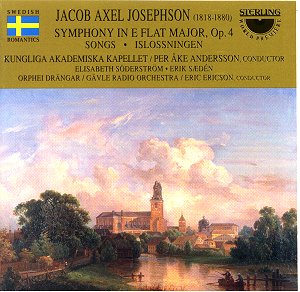JACOB AXEL JOSEPHSON (1818-1880)
1. Festive March (1850) 6.05
2. Symphony (1846-47) 38.25
3. Songs:-
Serenad 2.26
Tro ej gladjen (1842) 1.23
Sjung, sjung, underbara sang (1857) 0.57
Stjernklang (1842) 2.45
4. Islossningen for bar, ten, male voices andorchetsra
(1844-51) 8.52
 1. and 2.: Kungliga
Akademiska kapellet/Per Ake Andersson 3-8 March 1998 Uppsala University
1. and 2.: Kungliga
Akademiska kapellet/Per Ake Andersson 3-8 March 1998 Uppsala University
3 (songs 1-3 Elisabeth Soderstrom/Jan Eyron; song 4 AErik Saeden/Stig Westerberg)
rec 1964; May 1957 Stockholm;
4. Rolf Leanderson (bar) ChristerSolen (ten) Orphei Drangar Gavle Radio Orch/Eric
Ericson rec 25 Apr 1964 Uppsala University
 STERLING
CDS-1003-2 [61.39]
STERLING
CDS-1003-2 [61.39]

As I read through the list of items and sources for the tracks on this disc
I could almost see Bo Hyttner sifting through the record catalogues and making
the phone calls to assemble this disc. However I would not want to give the
impression that most of this disc is not newly recorded. The first five tracks
are recent (1998); not that any of the recording quality on the other tracks
is poor.
The first item is a bluff little march full of pomp and pride (and slightly
vacuous) recalling one of Wagner's rare concert marches.
The symphony is Josephson's only work in this genre. It is a work reflective
of the early romantic tradition: in keeping with Schumann's Spring Symphony
and Mendelssohn. Handicapped a little by a lack of distinction in the
themes it is nevertheless a work of sunny inclination.
The first three songs listed above are taken by no less than Elisabeth
Söderström and Jan Eyron. Erik Saeden and Stig Westerberg take
the last song which might easily be seen as ancestors of the straightforward
folkish settings of Carl Nielsen and, further back in time, Brahms' own settings
of German folk songs. Both singer and accompanists are masterly.
Islossningen is of the tradition of male voice brotherhood singing - solid
and bouncy - closer to 'good company in the alehouse' than to straight-laced
concert halls.
The orchestral playing is very decent but with the occasional creak or lack
of fluency e.g. in the first movement of the symphony.
There is much unassuming pleasure to be had here. Would that issues like
this would pour out so profusely from Lyrita.
Again thanks to Sterling and the Swedish National Council for Cultural Affairs
for making this possible.
Reviewer
Rob Barnett


![]()